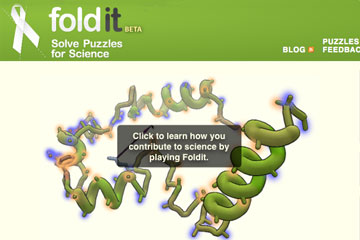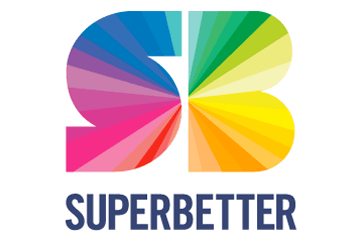Games for good
Two related stories I heard on NPR's On The Media yesterday have renewed my interest in the book Reality is Broken by Jane McGonigal.
 One you may have heard about on the news recently. Tens of thousands of ordinary people playing an online game called Fold-It were able to make a breakthrough related to a long-standing problem in AIDS research. In three weeks.
One you may have heard about on the news recently. Tens of thousands of ordinary people playing an online game called Fold-It were able to make a breakthrough related to a long-standing problem in AIDS research. In three weeks.
The problem involved working out the structure of a protein linked to HIV, and the gamers working together met the challenge.
It's a fascinating story, listen to it here:
New Online Game Helps Solve Medical Mysteries
This demonstrates the power of people working, or actually, playing together on real problems, one of McGonigal's prescriptions for fixing our broken reality.
Make it personal
 In the second story Ms. McGonigal tells how she invented a game called SuperBetter to help herself recover from a serious concussion.
In the second story Ms. McGonigal tells how she invented a game called SuperBetter to help herself recover from a serious concussion.
The game involves an adventure with goals, enemies and allies that you pick yourself. It helps create positive emotions needed for recovery.
In the game you set "Epic Wins," things you want to accomplish. McGonigal describes her first as simply being able to sit down and write for an hour.
A more playful-sounding epic win was actually a greater challenge: to go to a Lady Gaga concert. At that point in her recovery bright lights, loud music and crowded spaces all triggered severe symptoms. These triggers all became "Bad Guys" to be vanquished in the game.
On the positive side she set "Power-Ups," like cuddling her dog and listening to a favorite song.
Beyond self-help
The whole thing sounds brilliant. Here are benefits described on the SuperBetter website:
SuperBetter makes you stronger. It helps you build up your social, mental and emotional resilience in the face of any illness, injury or health goal.
Resilience is the ability to stay optimistic, curious, motivated and connected to others even in the face of an extreme challenge. It has been scientifically proven to improve health outcomes of all kinds. Playing SuperBetter makes you more capable of getting through any tough situation -- and more likely to achieve the goals that matter most to you.
In a way this sounds like what any self-help book promises. But a big difference is that the game play makes achieving goals more doable by adding the elements of fun and challenge. And the social part, working with your "Allies," adds a valuable human dimension to the process. I'm wondering if there's a way I can play even though I'm not trying to recover from anything.
What do you think? Listen to Gaming Back To Health.